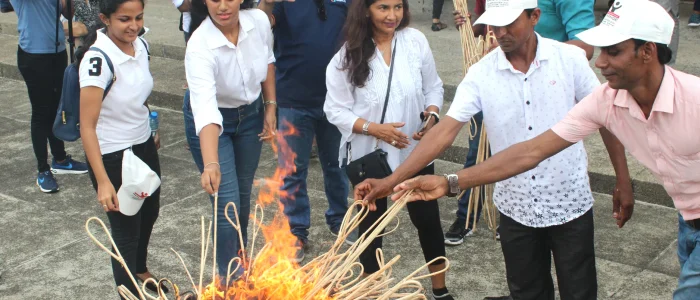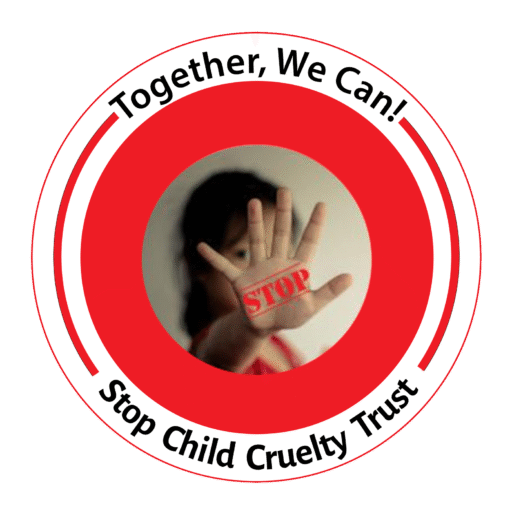The ‘Pentagon Proposal’ Submitted to HE President 2018

Hundreds of supporters burnt canes to signify the launch of the massive campaign to end corporal punishment. This shifted the momentum of a previously taboo subject towards shaping changes in attitudes by elevating ending violence against children to a daily topic of discussion.
Corporal Punishment (CP) is an archaic and heinous form of punishment of children, which is considered a crime and is banned in 132 (in 2018) countries. Corporal punishment is defined by the United Nations Committee on the Rights of the Child (UNCRC) as “any punishment in which physical force is used and intended to cause some degree of pain or discomfort, however light” (2001). More than 250 research studies show associations between corporal punishment and a wide range of negative effects and adverse psychological outcomes on the victims. No studies to date have found evidence of any benefits.
Whilst there have been some improvements in the approach to this matter, the relevant authorities have failed to implement circulars and failed to take appropriate action to end corporal punishment. Sri Lanka was issued a ‘red warning’ at the recently concluded UNCRC session in February 2018; section E paragraph 21 was " deeply concerned that high numbers of children are subjected to abuse and violence, including corporal punishment, and that corporal punishment remains legal in the home, in alternative care settings, and in penal institutions, as well as in schools.
The ‘Pentagon Proposal’ Submitted to HE President 2018
Corporal Punishment (CP) is an archaic and heinous form of punishment of children, which is considered a crime and is banned in 132 (in 2018) countries. Corporal punishment is defined by the United Nations Committee on the Rights of the Child (UNCRC) as “any punishment in which physical force is used and intended to cause some degree of pain or discomfort, however light” (2001). More than 250 research studies show associations between corporal punishment and a wide range of negative effects and adverse psychological outcomes on the victims. No studies to date have found evidence of any benefits.
Whilst there have been some improvements in the approach to this matter, the relevant authorities have failed to implement circulars and failed to take appropriate action to end corporal punishment. Sri Lanka was issued a ‘red warning’ at the recently concluded UNCRC session in February 2018; section E paragraph 21 was " deeply concerned that high numbers of children are subjected to abuse and violence, including corporal punishment, and that corporal punishment remains legal in the home, in alternative care settings, and in penal institutions, as well as in schools.

Hundreds of supporters burnt canes to signify the launch of the massive campaign to end corporal punishment. This shifted the momentum of a previously taboo subject towards shaping changes in attitudes by elevating ending violence against children to a daily topic of discussion.

Hundreds of supporters burnt canes to signify the launch of the massive campaign to end corporal punishment. This shifted the momentum of a previously taboo subject towards shaping changes in attitudes by elevating ending violence against children to a daily topic of discussion.
Corporal Punishment (CP) is an archaic and heinous form of punishment of children, which is considered a crime and is banned in 132 (in 2018) countries. Corporal punishment is defined by the United Nations Committee on the Rights of the Child (UNCRC) as “any punishment in which physical force is used and intended to cause some degree of pain or discomfort, however light” (2001). More than 250 research studies show associations between corporal punishment and a wide range of negative effects and adverse psychological outcomes on the victims. No studies to date have found evidence of any benefits.
Whilst there have been some improvements in the approach to this matter, the relevant authorities have failed to implement circulars and failed to take appropriate action to end corporal punishment. Sri Lanka was issued a ‘red warning’ at the recently concluded UNCRC session in February 2018; section E paragraph 21 was " deeply concerned that high numbers of children are subjected to abuse and violence, including corporal punishment, and that corporal punishment remains legal in the home, in alternative care settings, and in penal institutions, as well as in schools.
The ‘Pentagon Proposal’ Submitted to HE President 2018

Hundreds of supporters burnt canes to signify the launch of the massive campaign to end corporal punishment. This shifted the momentum of a previously taboo subject towards shaping changes in attitudes by elevating ending violence against children to a daily topic of discussion.
Corporal Punishment (CP) is an archaic and heinous form of punishment of children, which is considered a crime and is banned in 132 (in 2018) countries. Corporal punishment is defined by the United Nations Committee on the Rights of the Child (UNCRC) as “any punishment in which physical force is used and intended to cause some degree of pain or discomfort, however light” (2001). More than 250 research studies show associations between corporal punishment and a wide range of negative effects and adverse psychological outcomes on the victims. No studies to date have found evidence of any benefits.
Whilst there have been some improvements in the approach to this matter, the relevant authorities have failed to implement circulars and failed to take appropriate action to end corporal punishment. Sri Lanka was issued a ‘red warning’ at the recently concluded UNCRC session in February 2018; section E paragraph 21 was " deeply concerned that high numbers of children are subjected to abuse and violence, including corporal punishment, and that corporal punishment remains legal in the home, in alternative care settings, and in penal institutions, as well as in schools.
